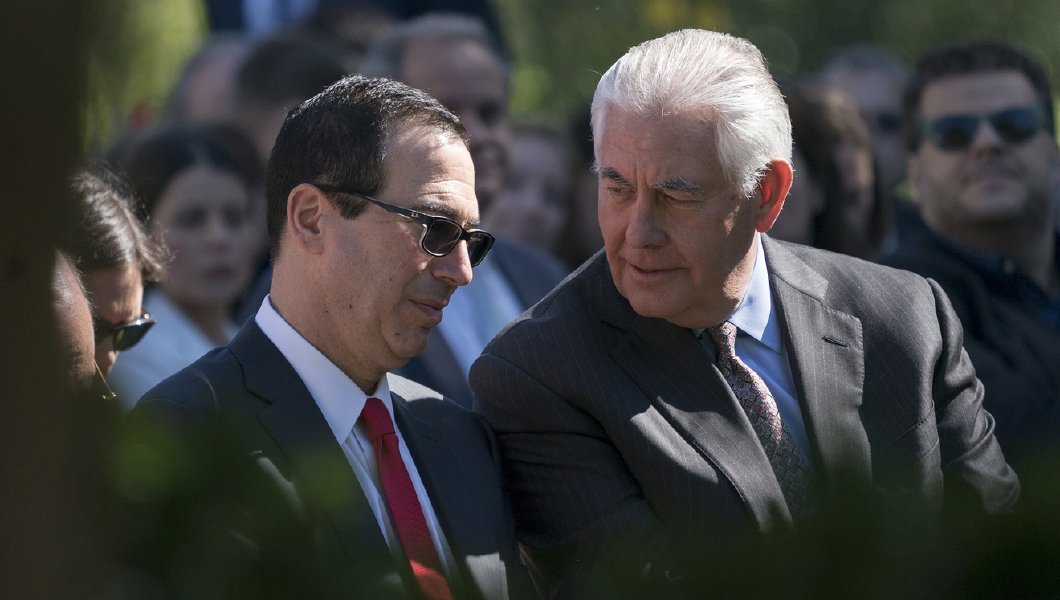22 December 2017 – Yesterday, the United States Department of the Treasury and Department of State announced sanctions against 15 individuals and 37 entities under the Global Magnitsky Human Rights and Accountability Act. Americans for Democracy & Human Rights in Bahrain (ADHRB) welcomes the implementation of this important new tool for combating gross human rights abuses and acts of corruption worldwide, yet we are disappointed that the Trump Administration has failed to take up cases presented regarding serious human rights abuses committed by Bahraini government officials. Ultimately, there were no individuals or entities from any Arab League member state designated in the Global Magnitsky Act’s first list of designees, despite the submission of eligible cases.
The Act authorizes the president to impose financial sanctions and visa restrictions on foreign individuals or entities that are responsible either directly or indirectly for extrajudicial killings, enforced disappearances, torture, or other gross violations of internationally recognized human rights, or that are responsible for acts of corruption. The Act was passed into law in 2016, and on 20 December 2017, the President enacted an Executive order (E.O.) to implement the first batch of designations under the Act. According to the Treasury Department, “the E.O. declares a national emergency with respect to serious human rights abuses and corruption globally, identifying these issues as threats to the national security, foreign policy, and economy of the United States.” The first submissions of suggested individuals were sent to the Departments of the Treasury, State and Justice earlier this year.
ADHRB submitted information on one individual and one entity:
- Ali bin Fadhul Al Buainain, Chief of the Office of Public Prosecution – As the leader of the Public Prosecution, Al Buainain has consistently overseen the conviction of individuals based on confessions obtained through torture. His office has also charged individuals with crimes against basic rights such as freedom of assembly or freedom of speech, using offense such as “unlawful gathering or assembly” or “seeking to overthrow the government” to prosecute peaceful activists, journalists, and political figures. The most egregious violation was the January 2017 execution by firing squad of three men following a trial that was riddled with due process violations and tainted by torture. In his capacity as Chief of the Office of Public Prosecution, Al Buainain is responsible for the actions of the institution’s employees, who act within the scope of their duties and with his knowledge and assent under the principle of command responsibility. Because the violations of individuals’ fair trial rights—including the disregard for torture allegations—is widespread and follows a pattern, and because the January 2017 execution was the first imposition of the death penalty in Bahrain in over two decades, it is impossible to assert that Al Buainain was unaware of the actions of the officers implicated in these abuses. Therefore, ADHRB submitted Al Buainain for financial sanctions and a visa ban for his role in, and command responsibility for, the gross human rights violations of torture and unlawful executions.
- The National Security Agency (NSA) – The NSA, Bahrain’s primary intelligence body, was suspended from 2011 to December 2016, after findings by the Bahrain Independent Commission of Inquiry (BICI) that it was responsible for torture following the 2011 uprising, including extrajudicial killing of Karim Fakhrawi, a founder of Al-Wasat However, King Hamad restored powers of arrest to the NSA in January 2017, arbitrarily reversing one of the only BICI recommendations the government had fully implemented. Since that time, ADHRB has received reports from more than 11 individuals that they have been arbitrarily detained and tortured by the NSA. ADHRB believes that these cases are only representative samples of the still wider reach of the NSA’s systematic and widespread use of torture, as well its involvement in violent raids.
Despite the well-documented evidence of abuse presented by ADHRB, the Trump Administration has declined to include Al Buainain and the NSA in the 2017 Global Magnitsky sanctions list. Instead, the Administration has failed to take up a single individual or entity from any Arab state, including Bahrain. The exclusion of serious human rights abusers such as Al Buainain and the NSA sends a message to the Government of Bahrain – and repressive and corrupt governments, institutions, and independent actors across the region – that it can continue to embezzle, steal, torture, and even kill with impunity.
“The Global Magnitsky Act is a laudable tool for accountability for engaging in gross human rights abuses and corruption. Yet, by ignoring well-documented cases in Bahrain and across the whole region, the Trump Administration is weakening the impact of the Act from the outset,” said Husain Abdulla, Executive Director of ADHRB. “Al Buainain, Bahrain’s Public Prosecution, and the National Security Agency have all committed grave abuses while repressing fundamental rights in Bahrain. Their actions not only undermine Bahrain’s stability, but also the security of critical US interests in the region. If the Trump Administration truly understands these types of abuses as a ‘national emergency,’ then it should not willfully disregard these clear ‘threats to national security.’”
ADHRB is profoundly disappointed by Trump Administration’s decision to exclude Al Buainain and the NSA from the Global Magnitsky sanctions list, and condemns the apparent subjugation of human rights to political or economic considerations. ADHRB calls on the US government to raise these serious violations with the Bahraini authorities and request that they take immediate measures to ensure the rule of law and respect for human rights in Bahrain.





